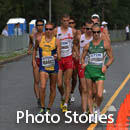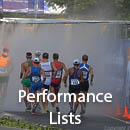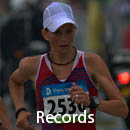
Photo of Jeff Salvage covering the IAAF World Championship by ace photographer Jennifer Salvage!
RaceWalk.com's coverage of the IAAF 2017 World Championships, London
Women's 50km Photo Story!
Men's 50km Photo Story!
Women's 20km Photo Story!
Men's 20km Photo Story!
Pre Race Story II
One of the strengths of our race walking community is the diversity of our backgrounds. Most of us want the same goal, but we may find different courses of action to get there. Thus, is the case with expanding women’s race walking to be gender inclusive.
As I post this, written previously, I sit at the start of history. The first women’s 50km event at the IAAF World Championships. It should be a moment of joy and of congratulations for women’s equality. Certainly on the surface, it is. Seven women, from four countries are towing the line in the longest footrace at the 2017 IAAF World Championships.
I’ve stated many times, my favorite race at the IAAF World Championships, Olympics and World Team Championships is the 50km. To be more accurate, I used to say the Men’s 50km. It’s with great pleasure that I can now say the 50km that is inclusive of men and women. Now we will have double the excitement, strategy and drama.
Unfortunately, there is a backstory. One that is not politically correct and one that to an extent has been suppressed. The movement for the inclusion of the women’s 50km can be traced back to a courageous American race walker, Erin Taylor-Talcott. I don’t think anyone would doubt that women would not be sitting on the starting line of the 2017 IAAF World Championships without her efforts. For this she should be congratulated.
Would the IAAF or USATF moved forward with an inclusive support of the women’s 50km without Taylor-Talcott’s legal challenge? Probably not. However, there is a big difference between fighting a respectful legal battle and constantly publicly berating the governing bodies that support our event. There is also a difference between winning a battle and having the other side feel respected or at least that they came away with something. The win-win scenario that actually moves everyone forward should have been the goal. There is the crux of the matter; is Taylor-Talcott’s crusade for women’s equality or a personal quest for individual glory?
Rumors have been flying around that as part of the IAAF settlement, Talyor-Talcott was offered a choice to have the women included in the 2017 IAAF World Championships or 2018 IAAF World Team Championships. This has been denied by Erin’s outspoken husband and fellow race walker Dave Talcott. Normally, I would have reached out to Erin directly, but before the race I didn’t want to take her focus off the race. Apparently, Dave shared the same sentiment since when international competitor and USA teammate Robyn Steven’s posted a disparaging comment (with no specific names) that Talcott interpreted as implying it was about Erin Taylor-Talcott. He personally called her up and bullied (my words not Robyn’s) her into changing the post. Talcott wanted no “direct person” references to athletes so as not to distract from their race. Robyn acquiesced, and Talcott went on to write 22 very-longwinded somewhat disrespectful comments. Stevens left them online for 24-hours then deleted them because “it was just too much and not professional on his part.”
The issue between choosing the IAAF World Championships and IAAF World Team Championships is huge.
- Having the women’s 50km walk included in the IAAF World Championships has a short-term satisfaction. The women are in! However, very few women are competing. The quality of the seven can be debated, but that’s been beat to death elsewhere, so we’ll skip that as part of this analysis.
- Having the women’s 50km walk included in the IAAF World Team Championships has the long-term benefit of allowing women sufficient time to train and qualify. In addition, the IAAF World Team Championships are being held in a year without a World Championship or Olympic event. Women could genuinely choose between the events and pick which one they preferred without sacrificing another World-stage opportunity.
Which event is likely to have a better impact on the movement? In my opinion, and many, dare I say almost unanimously, the stronger initial showing at the IAAF World Team Championships is the right course of action which is to support most women in this sport.
However, there is another opinion. Taylor-Talcott’s lawyer, Paul F. Demeester, held a press conference on 8/11/2017 to discuss his view that the IAAF’s reasoning on gender discrimination is flawed. First, let’s thanks Paul for all the effort he’s made on behalf of women’s race walking. He like many of us have a view of how to move the sport forward. His reasoning behind the inclusion of the women’s 50K is that IAAF and IOC are pushing for gender equality. That the old standards of there being enough interest both by factoring in the countries and total participants at an “elite” level no longer apply. He insists that the standard is now if there is a men’s event there must be a women’s event. He cites the IOC’s 2020 Agenda (https://stillmed.olympic.org/Documents/Olympic_Agenda_2020/Olympic_Agenda_2020-20-20_Recommendations-ENG.pdf) which pushes for gender equality, but it’s vaguely defined. I read it as only meaning the total number of participants at the Games must be equal, not the number of events or the number of participants per event.
This difference is very important. Certainly, one way to achieve gender equality is on an event by event basis. If however, the only criteria is overall numbers, then including the women’s 50km is not necessarily required. There are several other events that on an event basis are not gender neutral. Perhaps these will be fought in the future, or perhaps the overall number argument will rule the land. Events come and go from competition over the years. The ones the have longevity do so because of interest. Thus my point, the initial women’s 50km walk should be one with depth and planning to ensure future enthusiasm.
From my personal perspective. It’s not just about winning a legal case. Many roadblocks can be put up, and have been put up, when someone is dragged to the table. The compromise of waiting for the World Team Championships while not as expedient, wins more than just the legal battle. It would put on a spectacular show full of drama that makes Track and Field so exciting to watch.
When pushed to state whether an offer was made as part of the settlement that included a more timely event at the World Team Championships, DeMeester claimed the terms were confidential. We then spoke in hypotheticals where he pointed out he would have to do what was in the best interest of his client not necessarily the sport (hypothetically of course).
Despite Talcott’s denials, I have personally seen correspondence confirming this. Correspondence that included Talcott. Yet, the defense of Talcott and others speaking for those racing seems to be:
- We know more than you do
- You’re not a 50km walker so you don’t have a voice
- What have you done to move the agenda forward?
It’s certainly true that Talcott and Randall are privy to information the rest of us aren’t. However, the same is true on the flip side. Those of us with connections in USATF / IAAF may know many things that they don’t know. When I talked privately with Mike Randall, I brought up the real possibility that the efforts for inclusion of the women in the 50km could result in the remove of the men’s 50km. He replied that he hadn’t thought of that. Perhaps my concerns are based on knowledge they don’t know? Perhaps it’s just common sense, if we are too much of a thorn, maybe it’s just easier to get rid of all of race walking? We already have issues with legality. There are those that say don’t speak out, you’ll add fuel to the fire. I feel the opposite. The race walking community need to call a spade a spade and pressure the IAAF to permanently include the women’s 50km. We need to point out that this was a knee-jerk response to a lawsuit and the event shouldn’t be judged (as has been stated by IAAF Race Walking Chairman Mauricio Domilano) as to whether it should be included in the future.
Some fear that with the Olympics not wanting to expand the number of events, that a women’s 50km walk wouldn’t be welcome. One solution raised by Demeeter is that it can still be one even, a combined one. I see two flaws with this logic. Judging is already difficult enough, we don’t want to double the number of competitors to add to the challenge. Second, if various governing bodies determine that combined men’s and women’s 50km is a good idea, isn’t it logical for them to do the same with the 20km?
As part of the Taylor-Talcott settlement with USATF, USATF was legally mandated to support the women’s 50km in any way possible. They have honored their agreement admirably supporting both opportunity and prizes. Women have without question responded and we’ve seen an improved women’s field in US championships as well as shown with a full squad representing the USA in the women’s 50km. When was the last time we had a full squad in an event at the World Championships?
However, personally I feel the settlement with the IAAF has backfired, partially due to Taylor-Tallcot’s decision for the earlier race. IAAF seems to be putting on the worst possible initial event with a strict qualifying standard, unrealistic cutoff time, and ridiculously short timeframes for qualifying. Given the various quotes floating around, the deafening silence from the IAAF Race Walking Committee members. I corresponded briefly with Maryanne Daniel who claims the committee, maybe with the exception of Domilano, knew nothing before the public did. We need them and ourselves to rebuke this settlement and demand a proper 50km women’s walk in the IAAF World Team Championships and let the women have a fair chance!
Pre Race Story I
Every World Championships comes with it stories large and small. This year’s story is going to focus on a small number of athletes creating history. Seven women will toe the line for the 50km race walk at the World Championship. No longer is it the men’s event that women will compete in.
The 50km race is always my favorite and this year’s race should be a great moment for women’s equality. Like most pushes for equality, it didn’t come easily or without legal battles. For the most part, I’ve stayed out of the commentary as it centers around close friends and friendly acquaintances. However, now that it is center stage and at an event I am covering I can not shy away from commenting.
The reason I say it should be a great moment and not that it is a great moment is the timing athletes were given notification for their participation, the selection process, and the level of competition to be conducted in London. This was not a well thought out plan of inclusion, but a domino response to legal challenges. IAAF President Sebastian Coe stated, “To ensure the long-term credibility of the World Championships, we will follow the recommendation of the Race Walking Committee and assess the development of the event to determine whether there are sufficient numbers of athletes and countries legitimately interested.” However, publicly the IAAF Race Walking Committee has been surprisingly unvocal.
One issue getting world-wide participation for the women’s walk is that women currently racing at the 20km have their funding based on 20km performance. To switch over to the 50km, in many cases, means competing and possibly foregoing funding. This has led some women not to try to for the 50km this time around. Certainly, some men who excelled in the 50km did not have a fast 20km. The same can be said for the women who qualified for the 50km and have not previously gotten a 20km standard.
What we are left with is an anemic sized field of women, some of whom are not world-class by the standards set by the other three events because they were included based on a legitimate / legal rule for area champions. While nothing should detract from their personal accomplishments a 5 hour 50 km performance is simply not world class. What is world class? Let’s look at it from a number of calculations.
How do the times of the women’s 50km as compared to the other three events. Admittedly, I expected the differences to be greater than they are.
For those into the math, try to follow this table:
Hours |
Minutes |
Seconds |
Total Seconds |
World Record/Standard |
20km Stand / 50km Stand |
||
Men's 50km WR |
3 |
32 |
33 |
12753 |
0.86 |
||
Men's 50km Standard |
4 |
6 |
0 |
14760 |
|||
Men's 20km WR |
1 |
16 |
36 |
4596 |
0.91 |
||
Men's 20km Standard |
1 |
24 |
0 |
5040 |
Men - 0.34 |
||
Women's 20km WR |
1 |
24 |
38 |
5078 |
0.88 |
||
Women's 20km Standard |
1 |
36 |
0 |
5760 |
Women - 0.36 |
||
Women's 50km WR |
4 |
8 |
26 |
14906 |
0.92 |
||
Women's 50km Standard |
4 |
30 |
0 |
16200 |
|||
Personally, I think I would feel differently if the small pack of walkers were at Ines Hernandez’s level of competition. She’s shown both in the 20km and the 50km world class times. Others, not quite as much, most being at the back end of the standard. Do they deserve to be there by legal standards? Yes, most definitely. Do I and others want them to succeed and pave the way for future bigger and better fields? Absolutely! However, there is an undercurrent of conversation that this is just a stunt to end the 50km women’s movement and possibly the men’s 50km as well. If the darker side of the story is true, then a last-minute thrown together women’s 50km can do more harm than good.
There’s also another consideration. We, the USA, can’t even fill a full squad of 20km women or men at the Olympics or World Championships. Adding another even dilutes our presence if standards in the women’s 50km are raised to the equivalent level of other events.
Hopefully, things won’t be as dark as I picture them. While one qualifier outshines the field, the battle for silver and bronze should be fierce and inspire other women to join the 50km ranks leading to true equity. Best of luck to Katie Burnett, Erin Taylor-Talcott, Susan Randall and the rest of the field!






